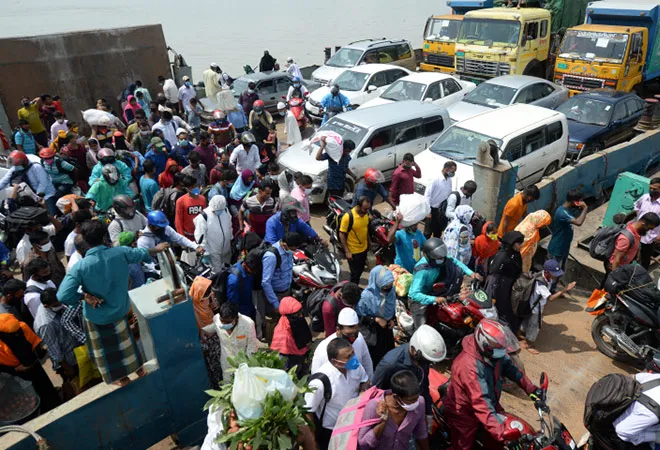For 24 Bangladeshi migrants, the dream of a prosperous life in a faraway land was shortened abruptly after they were killed by abductors in Libya last month. The Bangladesh Foreign Ministry said that the migrants were abducted while crossing into Libya in search of work and were tortured to extract a ransom.
The incident has exposed the horrific exploitation and torture a migrant has to experience in his journey with the hope of a better future in far-flung countries away from their home. The present incident once again highlighted the need for strict action by the concerned country and the international community to eliminate the menace of human trafficking.
The incident has once again exposed the unholy nexus between uncanny man-power exporters and the human-traffickers who predate many innocent people. Thousands of Bangladeshis have fallen victim to such unholy nexus and faced inexplicable torture, captivity and slavery. Yet, the urge for a better economic opportunity abroad is making them take the risk.
‘Basket case’ no more
In Bangladesh, migration has proved to be a successful means for many to come out of poverty. Given the success witnessed, many want to imitate the same for themselves to get a respite from poverty. Though the country has achieved significant economic growth over the past years, a large portion of the country’s population still remains poor.
Employment opportunity for the youth, primarily for the unskilled, still remain scarce. Hence, many feel migration could be an alternative to transform their luck and lives. Unfortunately, their poverty coupled with ambition is aiding the human-traffickers to prosper as they often pose as man-power businessmen who can help to achieve their dream.
Migration has been intricately linked to the development of the country. At the time of independence in 1971, the country was referred as a ‘basket case’ because of the abject poverty at the time. It has shed its image long back and is on the path of prosperity and growth. The economic success resulted in Bangladesh qualifying as a middle-income country from least developed, a status the country is likely to attain in 2021.
Migrant labour has been one of the reasons behind the present success of the country because their remittances form a major share for forex over the past decades. As of now, nearly 12 million Bangladeshis have been living abroad and they have been sending large sum back as remittances. In 2018, the earning from such remittances was around $15 billion, which was approximately five percent of the total Gross Domestic Product (GDP). In 2019, the country received remittances worth nearly $18 billion.
Manpower export
Bangladesh has formal arrangements with countries across the globe for export of manpower. These arrangements resulted in a thriving man-power business in Bangladesh. Mostly, migrant workers travel via formal channels. However, a section often takes informal ways. Traditionally, countries in the Middle-east like Saudi Arabia, United Arab Emirates, Kuwait, Qatar were the prime destination for Bangladeshi manpower.
Also, countries like Syria, Yemen and Libya hired migrants from Bangladesh to work primarily in the oil industry. But the slowing down of the economy in the gulf countries largely due to the falling oil prices and conflicts in the region impacted Bangladesh’s manpower market.
The recent trend, however, suggests Europe as the most preferred destination of Bangladeshi migrants. From January-August 2017, around 8,700 Bangladeshi migrants landed in Italy comprising roughly around 9 percent of all the maritime arrivals, claimed the International Organisation of Migration. Often, conflict-torn Libya is used as a route for entry into Europe.
Neither cheap, nor easy
The journey of the migrants is neither cheap nor easy. The migrants have to pay a large sum of money, nearly around $9000-$10000 each. Also, the risk is high because the journey involves transit through difficult terrains, conflict-driven countries and perilous sea voyages.
Also, exploitation by the traffickers has been a concern. For many, these hazards have paid fruits because their success in reaching the desired destination has contributed to improving their lives. Sadly, not all were or are lucky and the dream of a good life gets terminated in the mid-way, like in the present incident. Dead bodies of hundreds of migrants floating in the sea near Malaysia in 2015 is also a telling example of the unfortunate fate of many of such migrants.
Normally, the authorities in Bangladesh are accused of being lethargic in reacting to control human trafficking. The main grievance has been the low conviction rate in the cases of human trafficking, which people consider as a reason for enhancement of the confidence of the human traffickers. Lately, however, the government has become serious in curbing human trafficking in the country.
In this regard, actions have been taken both at the domestic and international level. In 2019, Bangladesh signed the UN Treaty to Combat Human Trafficking. Also, showing zero tolerance to human traffickers, law enforcement agencies undertook strict actions against the human traffickers. Just after the Libya case, the authorities have arrested 6 such perpetrators. This action is positive but to be more effective, Bangladesh will need cooperation from the international community because an international crime like human trafficking needs cross border cooperation.
This commentary originally appeared in South Asia Weekly.
The views expressed above belong to the author(s). ORF research and analyses now available on Telegram! Click here to access our curated content — blogs, longforms and interviews.




 PREV
PREV


